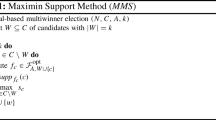Abstract
Forn candidates, a profile of voters defines a unique Borda election ranking for each of the 2n − (n + 1) subsets of two or more candidates. The Borda Dictionary is the set of all of these election listings that occur for any choice of a profile. As such, the dictionary contains all positive features, all flaws, and all paradoxes that can occur with single profile, sincere Borda elections. After the Borda Dictionary is characterized, it is used to show in what ways the Borda Count (BC) is an improvement over other positional voting methods and to derive several new BC properties. These properties include several new characterizations of the BC expressed in terms of axiomatic representations of social choice functions, as well as showing, for example, that the BC ranking ofn candidates can be uniquely determined by the BC rankings of all sets ofk <n candidates for any choice ofk between 2 andn.
Similar content being viewed by others
References
Arrow KJ (1952) Social choice and individual values. Wiley, New York
Brams S, Fishburn P (1983) Paradoxes of preferential voting. Math Mag 56: 207–214
Fishburn P, Gehrlein W (1976) Borda's rule, positional voting, and Condorcet's simple majority principle. Public Choice 28: 79–88
Haunsperger D (1991). PhD dissertation, Northwestern University, Department of Mathematics
Nurmi H (1987) Comparing voting systems. Reidel, Dordrecht
Saari DG (1982) Inconsistencies of weighted summation voting systems. Math Oper Res 7:479–490
Saari DG (1984)The ultimate of chaos resulting from weighted voting systems. Adv Appl Math 5:286–308
Saari, DG (1987) Chaos and the theory of elections. In: Kurzhanski AB, Sigmund K (eds) Dynamical systems. (Lect Notes Econ Math Systems, vol 287) Springer, Berlin Heidelberg New York, pp. 179–188
Saari DG (1988) Symmetry, voting, and social choice. Math. Intell 10: (No 3):32–42
Saari DG (1989a) A dictionary for voting paradoxes. J Econ Theory 48:443–475
Saari DG (1989b) Calculus and extensions of Arrow's theorem. J Math Econ
Saari DG (1990a) Susceptibility to manipulation. Public Choice 64: 21–41
Saari DG (1990b) Consistency of decision processes. Ann Oper Res 23: 103–137
Saari DG (1991) Relationship admitting families of candidates. Soc Choice Welfare 8
Smith JH (1973) Aggregation of preferences with variable electorate. Econometrica 41: 1027–1041
Young HP (1974) An axiomatization of Borda's rule. J Econ Theory 9:43–52
Young HP (1975) Social choice scoring functions. SIAM J Appl Math 28:824–838
Van Newenhizen J (1988) A geometric investigation of voting techniques: a comparison of approval voting, positional voting techniques and the Borda count. Northwestern University PhD dissertation, 1988
Author information
Authors and Affiliations
Additional information
This research was supported, in part, by NSF grants IRI8415348, IRI-8803505 and a Fellowship from the Guggenheim Memorial Foundation.
Rights and permissions
About this article
Cite this article
Saari, D.G. The Borda dictionary. Soc Choice Welfare 7, 279–317 (1990). https://doi.org/10.1007/BF01376279
Received:
Accepted:
Issue Date:
DOI: https://doi.org/10.1007/BF01376279




